The horror toll of 40-50 concussions has left Jay Schulz on edge – knowing he could snap at any time. He reveals his brain damage diagnosis and his battles with anxiety, depression mood swings, insomnia and memory loss.
Jay Schulz is sitting on his couch, watching TV and his teeth start grinding.
He can feel himself getting frustrated.
What is supposed to be a relaxing time for the 37-year-old father-of-four is interrupted by an inner rage inside him.
Soon, the former Richmond and Port Adelaide forward snaps at nothing in particular.
Doctors have told Schulz his anger, mood swings and anxiety can be attributed to brain trauma he has from repeated head knocks during his AFL career.
“It’s been pretty confronting for the family,” Schulz tells News Corp.
“My kids don’t understand there’s something wrong with Dad’s brain, which has changed the way he is – it’s changed my personality.
“I used to be a very relaxed, calm guy, now I’ve got high anxiety, anger, depression, a very short fuse.
“I can be fine, sitting, watching TV and all of a sudden I can feel myself grinding my teeth for no reason whatsoever.
“You start to not be able to think or do or feel things you used to be able to and that makes you frustrated, and that makes you want to escape.
“Then you start doing things that make it even worse.”
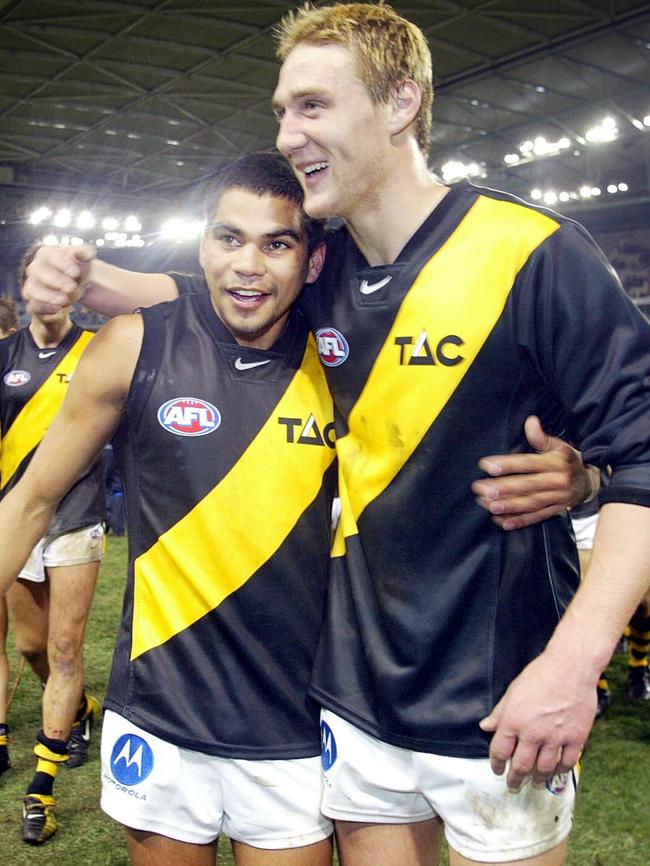
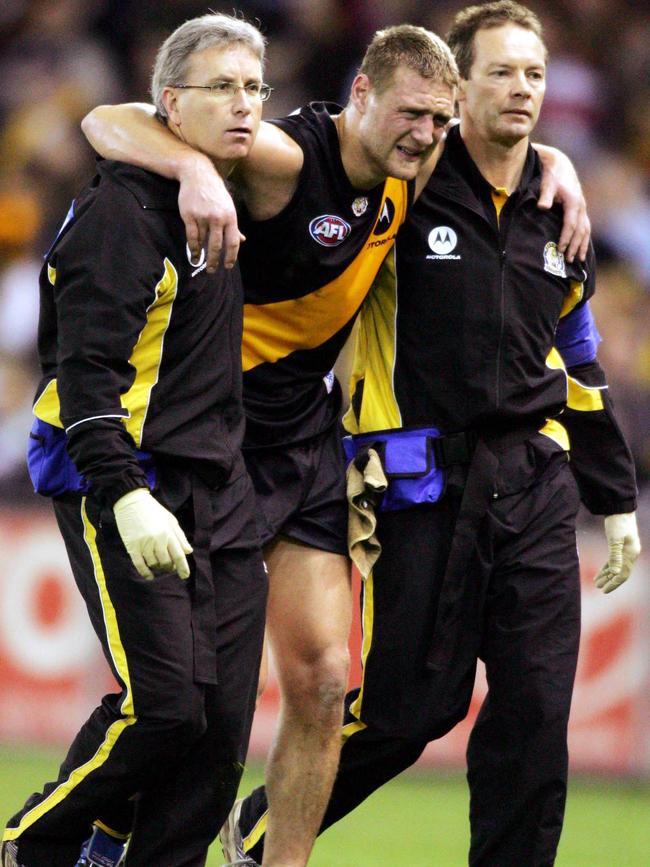
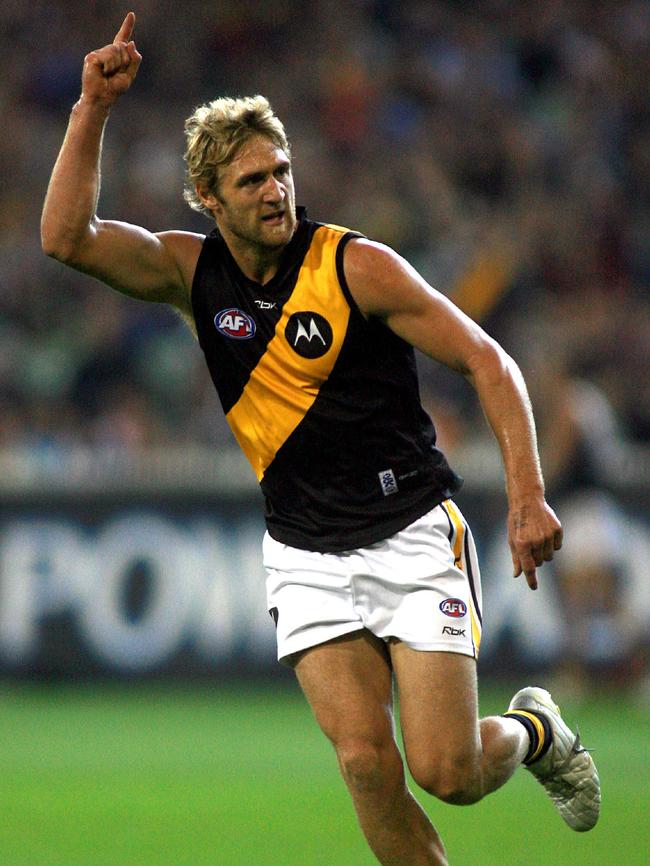
Schulz, now based in Launceston as a coach education manager at AFL Tasmania, has been seeing symptoms of his brain damage for the past two years.
Insomnia and memory loss are other issues he has been battling.
“Most days I open up my laptop and have to go into my sent messages to realise what I’d done the day before with work,” he says.
“Even guys I work with, they’ll see my mood is some days down, other days a lot better.
“I’ll ring people and they’ll say ‘yeah mate, we actually spoke about this two days ago’.
“So I’ve had to tell work colleagues what’s happening because they’ve been going ‘what’s going on with this fella?’”
Schulz, whose last AFL game was in 2016, sought help for anger issues about three years ago.
He was seeing a therapist and psychiatrist, who prescribed him anti-anxiety medication and advised him to chat with concussion campaigner Peter Jess.
About 18 months ago, a doctor told Schulz he thought he might have brain damage.
After speaking to Jess, Schulz volunteered to be part of a Swinburne University study, which used a magnetoencephalography (MEG) scan to identify brain activity and measure small magnetic fields produced in his brain.
The period before receiving the findings provokes anxiety.
“I’d already accepted the fact I had permanent damage, I just didn’t know how much,” he says.
In early June, results came back showing he had 19 areas of his brain with trauma.
The most damage is to his frontal temporal lobe, impairing decision-making.
Knowing that has given clarity to his family, which includes his wife, Amy, children Halo, 10, Beau, 8, Tate, 6, and Rafi, 2.
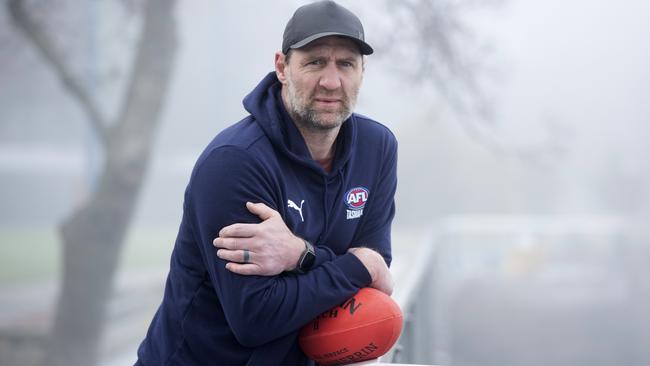
But it has been incredibly challenging to hear.
“It’s ‘sh**, what now? And when?’ All those things run through your head and will continue to,” he says.
“It’s almost like you’re waiting for a ticking time bomb for something to change (inside).”
Schulz’s curiosity has since got the better of him.
“I probably shouldn’t have done it … but you start Googling ‘what happens if this is damaged’,” he says.
“I didn’t sleep much that night.”
A big concern for Schulz is that doctors can tell concussion victims what is damaged but not how exactly they will be affected or when.
He thinks the AFL needs to set up a multimillion-dollar fund for former players who have long-term effects from brain trauma.
Schulz’s feelings about the game are only becoming more complex.
Beau loves footy and has started playing at junior level.
He is also enjoying soccer.
Does he follow in his dad’s footsteps or play the other code?
“I’m completely torn,” Schulz says.
“His mum doesn’t want either of our boys to play footy because of what she’s seen happen to me.”
Football remains a key part of Schulz’s life.
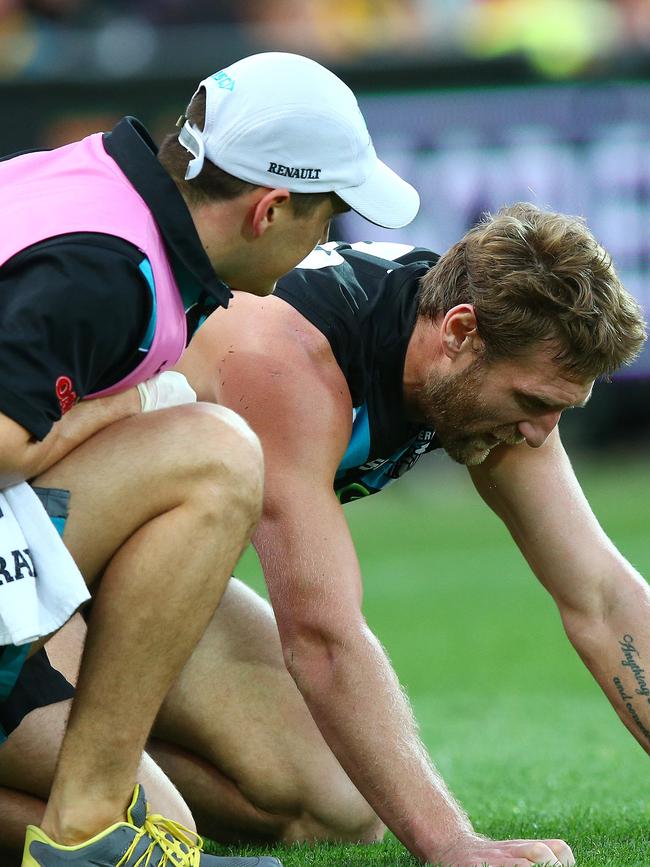
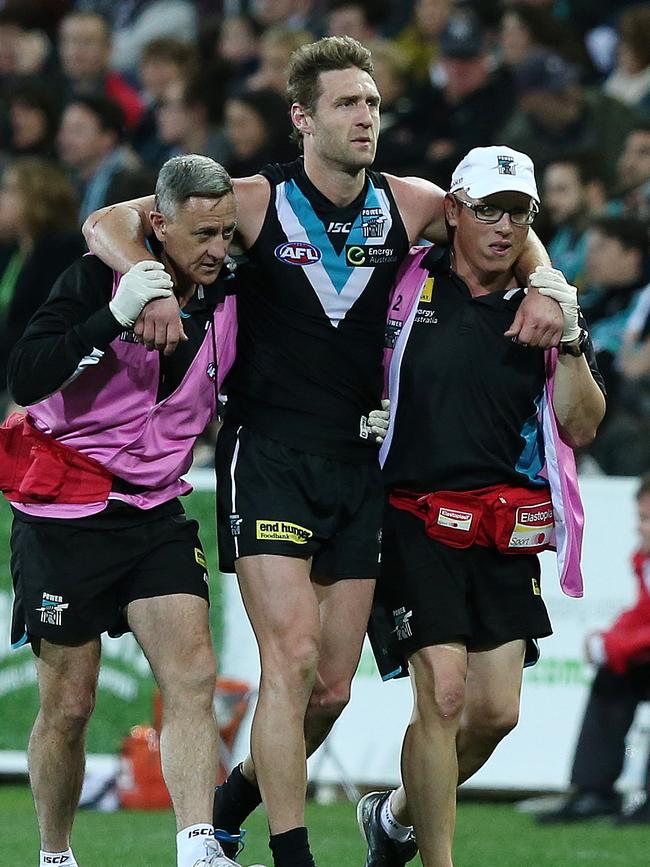
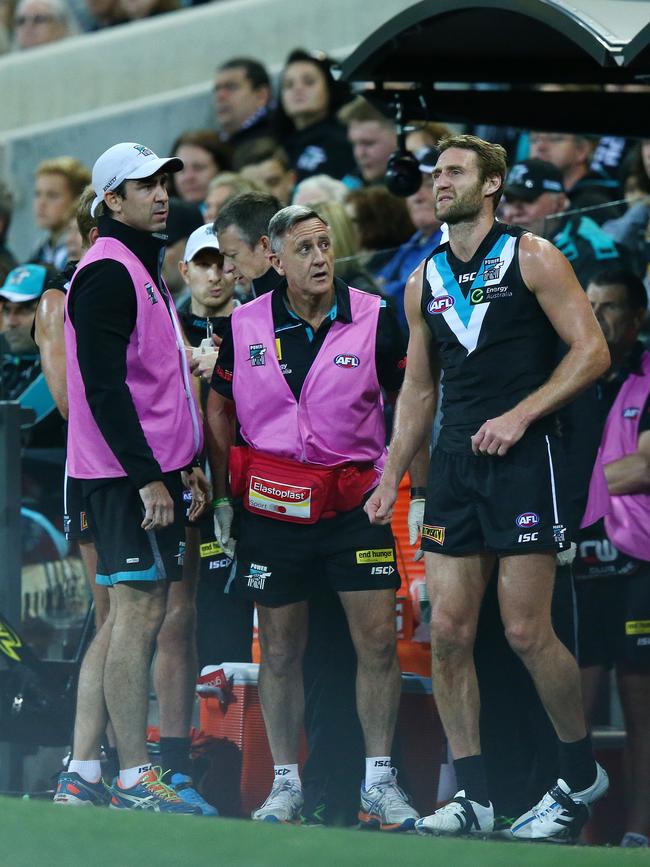
His job takes him across Tasmania to mentor coaches, he has provided special comments for ABC Grandstand this season and he loves watching the game.
His biggest concern with this generation of players is their lack of understanding about what can happen to them and the notion of pushing on through head knocks.
Schulz has kept quiet about his battle.
But watching rugby league’s third State-of-Origin game earlier this month and seeing guys stay on the field after hits to the head compelled him to tweet about concussion.
“As someone who now knows he has permanent brain damage that has changed them as a person I wish players new (sic) it’s not tough to keep playing no matter if they think they are letting their teammates down,” he tweeted.
Schulz is reflective when asked about it.
“Knowing what I know now, you just ask the question – is it all going to be worth it in the end?”
“It’s going to take generational change to teach your kids that if you fall over and hit their head, and don’t feel OK, that it’s OK to come off the ground and not come back on, even if they feel fine 20 minutes later.
“It’s going to be hard to change the 25-year-olds – they’ve played the same way for 20 years – but it’s got to start somewhere.
“I just want guys to know because it’s happening to me now and I don’t want that for other players.
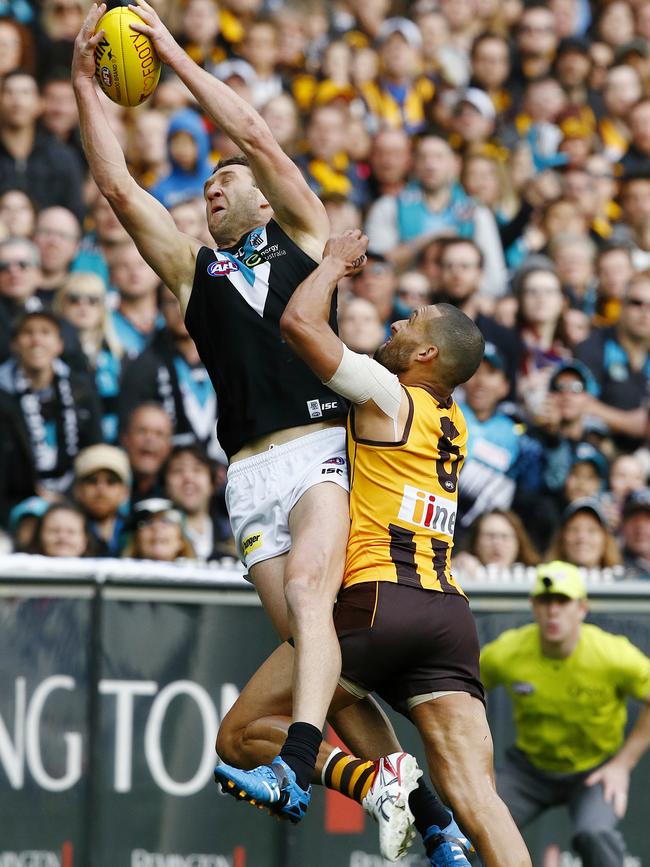
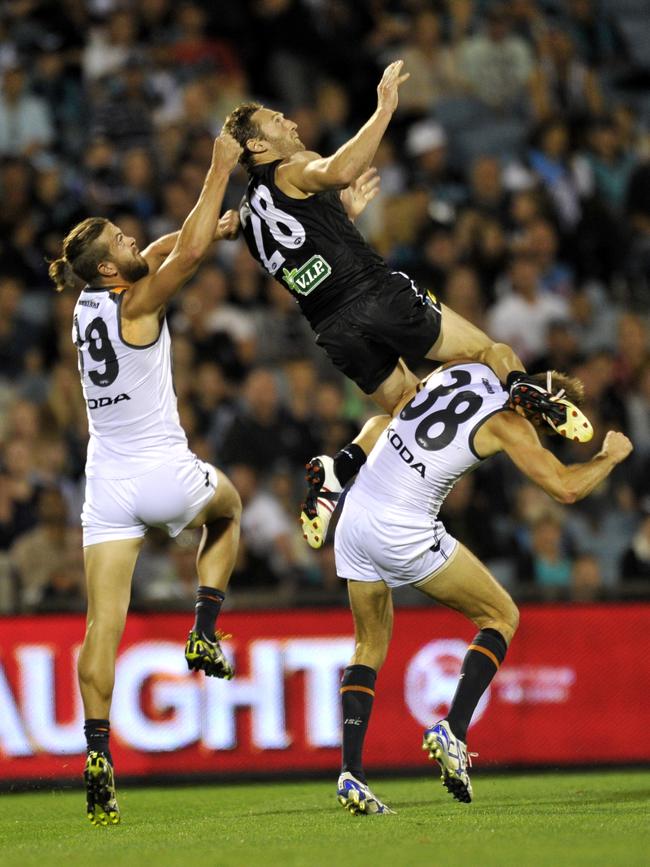
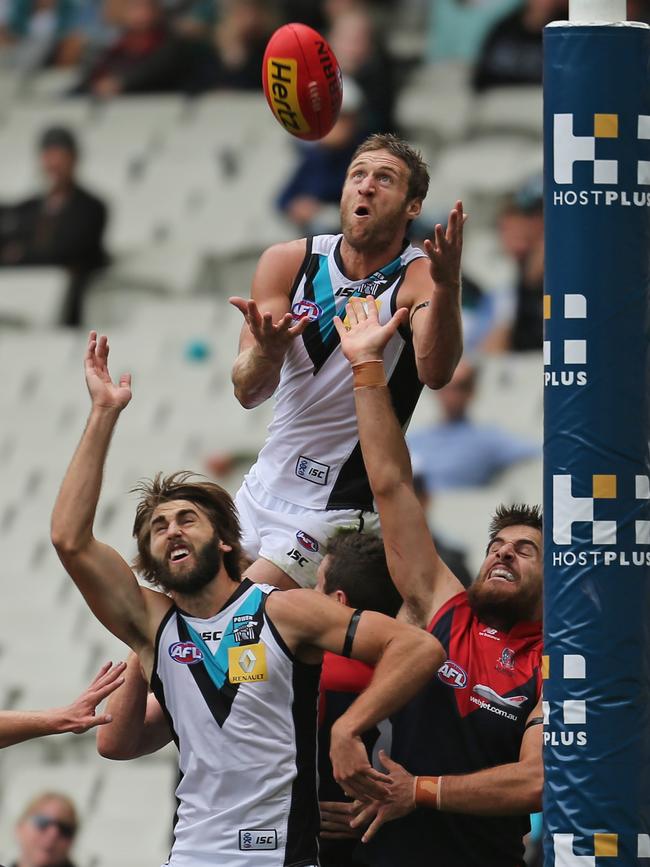
“I want them to be aware of what could happen.”
Schulz says he has told some football mates about his struggles, as well as the AFL Players’ Association, but not his former clubs.
Opening up about his experiences at a coaching conference in Melbourne about a month ago – four days after he received his scan results in a 45-page report – has helped him.
“It’d been bottling up,” he says.
“I don’t think anyone expected me to do it and they were all like ‘sh**’.
“But I wanted to get that message out.
“Putting that out to every playing group would be powerful.”
Schulz is now using weekly planners to remind him of things he needs to keep on top of in his battle.
“No one can tell you what you’re going to be like in 10, 20 years,” he says.
“I’m trying to put things in place so I can continue to do what I do on a daily basis with the kids and still have a happy time without trying to worry about it every day.”
SCHULZ HAD 30-40 CONCUSSIONS DURING HIS CAREER
Schulz is one of 10 ex-players who have undergone head scans as part of a Swinburne University study to learn how concussions have affected them.
He says the AFL urgently needs to create a multimillion-dollar compensation fund to help concussion victims.
The 37-year-old, whose last AFL game was in 2016, estimated he had 40 to 50 concussions during his 194-game career.
Schulz told News Corp his family had been seeing side-effects of his head injuries, including anxiety, depression, mood swings, insomnia, and memory loss, for the past two years.
He was also concerned about long-term issues, such as whether he might suffer from neurodegenerative diseases like chronic traumatic encephalopathy (CTE).
Under a plan pitched by concussion campaigner Jess, former top-level footballers who suffered from long-term effects of head knocks would have access to a fund that the league added $25m to annually.
“I wanted to be one of the 10 guys that did all the testing because I knew it was starting to affect me, my family, work and I wanted to know what I can do going forward to help,” said Schulz.
“The AFL have tried to do things as best they can, as quickly as they can.
“The work they’ve done in the concussion space in recent years has been amazing.
“But we need to do something for the guys that it’s happened to because in 20 years they could be a vegetable and they need care.”
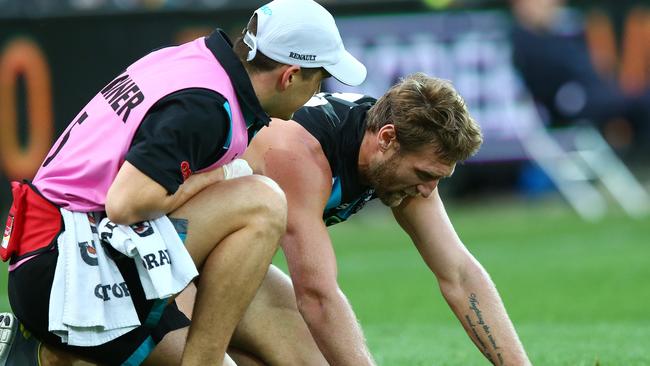
PLAYERS NEED MORE EDUCATION
Schulz, who played for Richmond from 2003-09 then Port Adelaide from 2010-16, was knocked out four times during his AFL career.
The three-time Power leading goalkicker said although players reacted differently from concussions, many were not aware they could get them from more innocuous hits and still have long-term consequences.
Schulz believed players at all levels needed extra education on the issue.
“The ones where you go up in a pack, come down, hit your head on the ground, see stars, do your concussion report but at the end of that you seem fine again and keep playing ... they’re the ones that caused the most damage to me because the brain does not get a chance to rest,” he said.
“I easily would’ve had three of those every season over 14 seasons and all of a sudden it adds up to 40, 50 concussions.
“Players need to be educated more and spoken to by past guys who know what’s going to happen or are having things happen to them now.
“When you get that first knock, it’s about stopping then.
“Not ‘am I OK? I’ll continue on’.”
Schulz said he would happily visit clubs to spread the message.
“The AFL can tell them things, but it takes a past player for everyone’s ears to prick up,” he said.
“This could become a passion project for me.”
WHY SCHULZ WANTS TO DONATE HIS BRAIN
Schulz has already signed up to donate his brain to the Australian Sports Brain Bank, which assesses CTE and other neurological disorders associated with repetitive head knocks in sport.
CTE can only be diagnosed after analysing the brain post-mortem.
People with it tended to suffer from cognitive impairment, behavioural abnormalities and mood swings, while many developed depression.
Former AFL stars Graham “Polly” Farmer, Danny Frawley and Shane Tuck were found to have had CTE.
“You read about the symptoms and I go ‘I’ve got that, I’ve got that, I’ve got that’, but no one really knows,” Schulz, a father of four, said.
“It’s hard not to feel that way when you read about it and what people go through ... it destroys people.
“There’s a reasonable chance it’s going to affect me as well.”
Schulz is not involved in any action against Port Adelaide or Richmond, nor does he blame the clubs or league for his concussions.
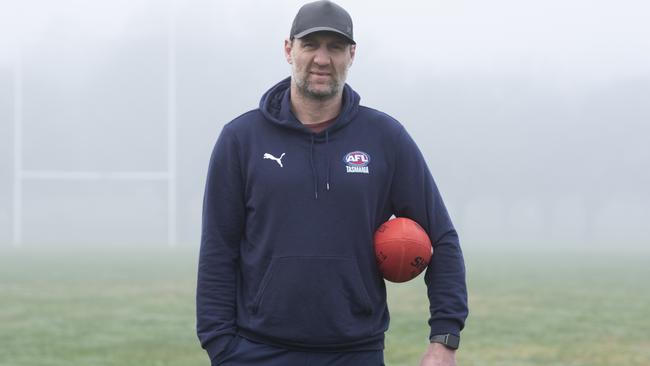
The Power and Tigers do not know about the extent of his injuries.
Schulz said there was not a lot of concussion information in the AFL early in his career but it became a hot topic during the latter part.
He said football, particularly at lower levels, still had too many players who remained on the field after a head knock, thinking they were helping the team.
“You’re in the heat of the moment,” he said.
“And you wouldn’t think about it (the head injury) after the game because you wouldn’t get any symptoms, have a headache or anything like that.”
Schulz would like to see players who were knocked out or failed concussion tests miss a minimum of two games, rather than one, under AFL concussion protocols.
Under existing guidelines, players who have suffered from concussions go through a return-to-play process that includes rest, symptom-limited activity, gradual increase in physical activity and a medical clearance prior to full-contact training.
He believed working for the AFL gave him some responsibility to tell his story.
“I love the fact it’s a contact sport and the way Australians play their sport, and I love the fact how much work there’s been done in the concussion space the last five or six years,” he said.
“But after getting my report back, I realise how much more work there’s needed to be done.”
A spokesperson for the AFL said it believes the league has conducted the competition with a duty of care for 126 years of the VFL/AFL, informed by the relevant information it has had at the time.
“The AFL employs a number of experts, consultants with a wide range of experts and expert bodies and constantly informs itself of all the science, and it maintains and adapts its Concussion Guidelines accordingly.
“Over the past two decades we have changed rules, strengthened protocols and educated our clubs and players on the reasons why we are treating the issue so seriously.”

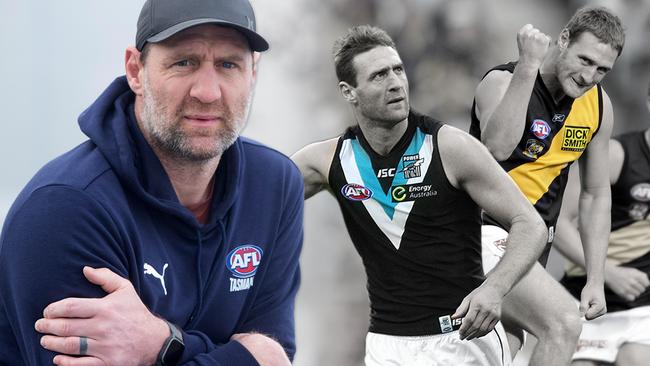
Add your comment to this story
To join the conversation, please log in. Don't have an account? Register
Join the conversation, you are commenting as Logout
‘Straight to the jaw’: Star Pie in huge strife
Collingwood star Dan Houston, who has only just returned from a long suspension, appears set for another stint on the sidelines.
Magpie mauling puts Blues’ season on the canvas
The Blues made the early running at the MCG, but we know they can fade away... but all eyes will be on a star Magpie after a head-high bump on a Carlton opponent.